2024年中考英语专题八情态动词及系动词课件(共33张PPT)
文档属性
| 名称 | 2024年中考英语专题八情态动词及系动词课件(共33张PPT) | 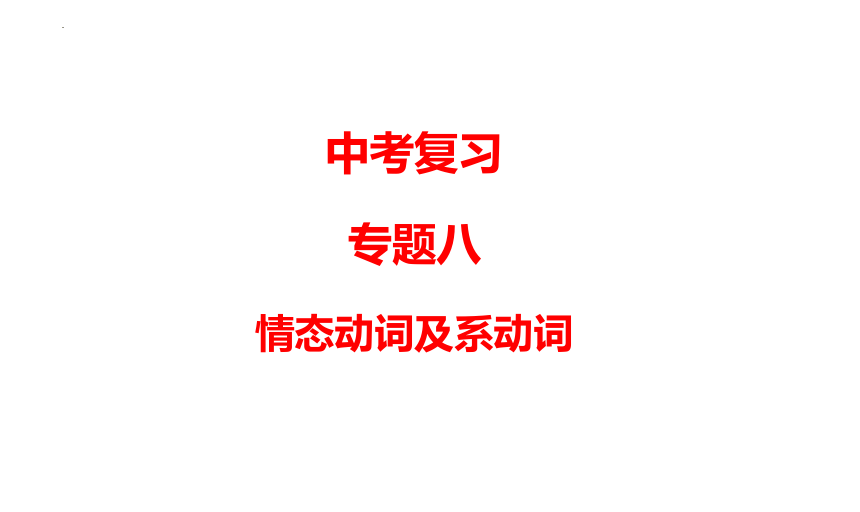 | |
| 格式 | pptx | ||
| 文件大小 | 138.7KB | ||
| 资源类型 | 教案 | ||
| 版本资源 | 通用版 | ||
| 科目 | 英语 | ||
| 更新时间 | 2024-02-28 19:33:11 | ||
图片预览

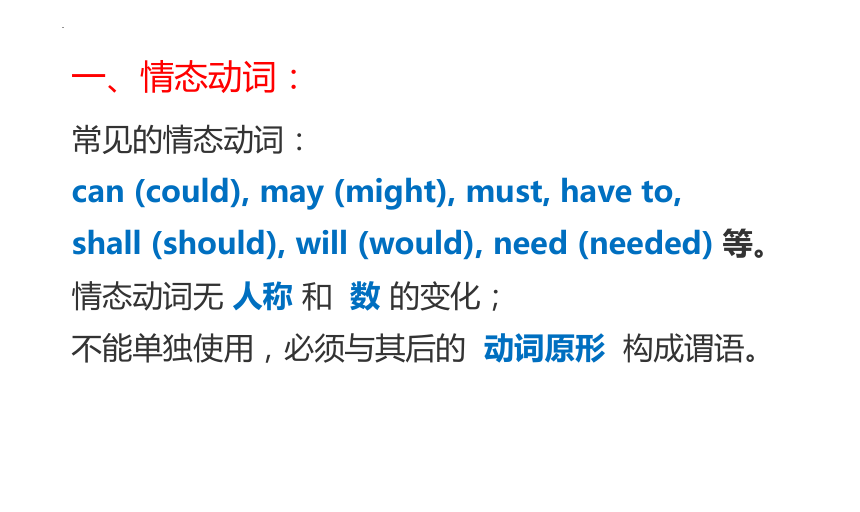
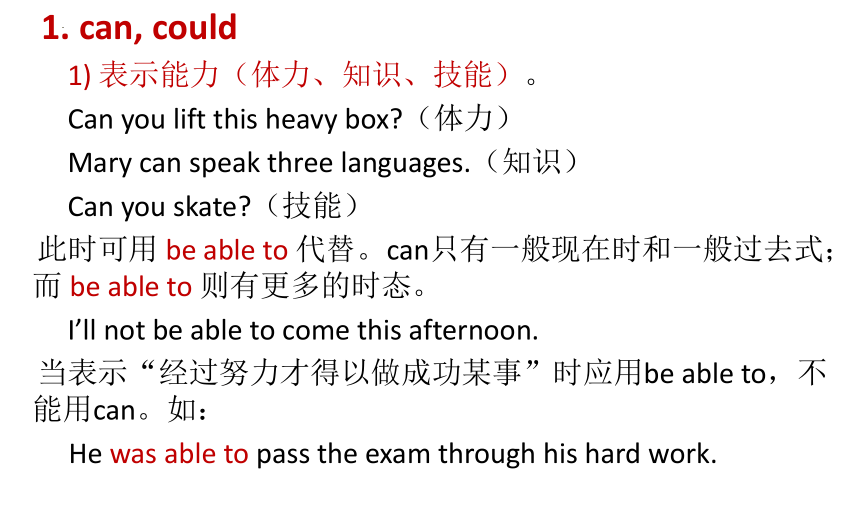
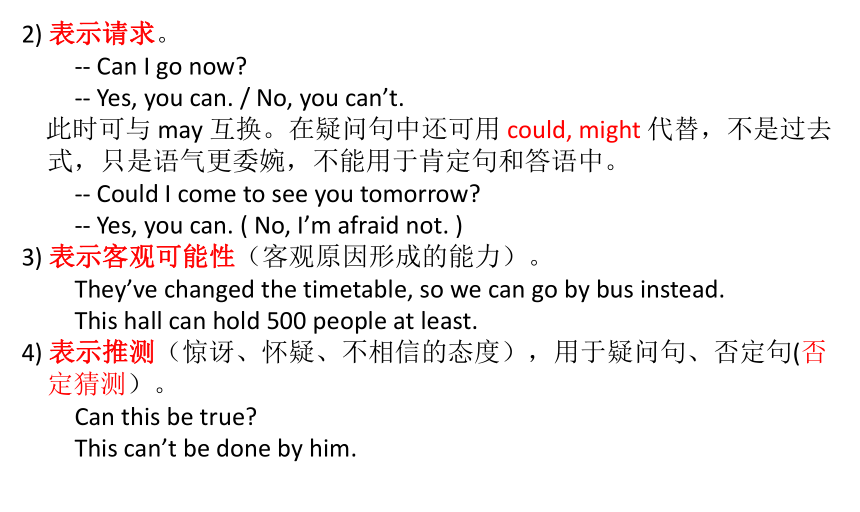

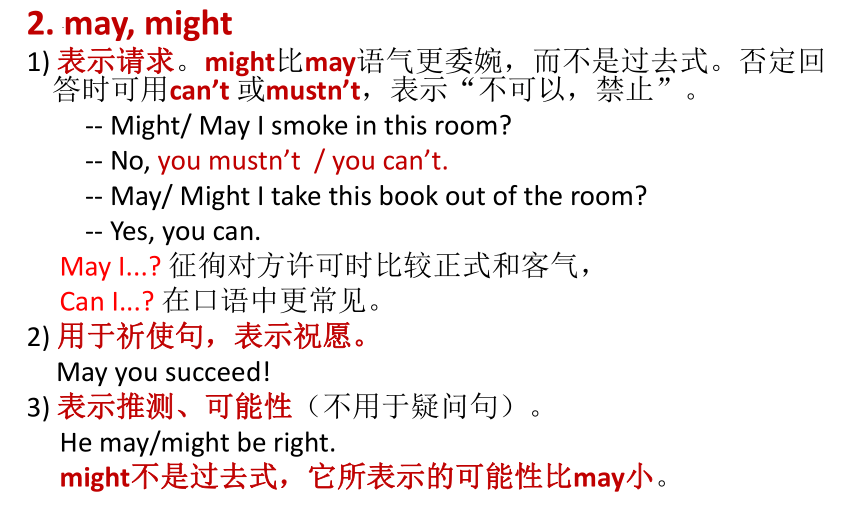
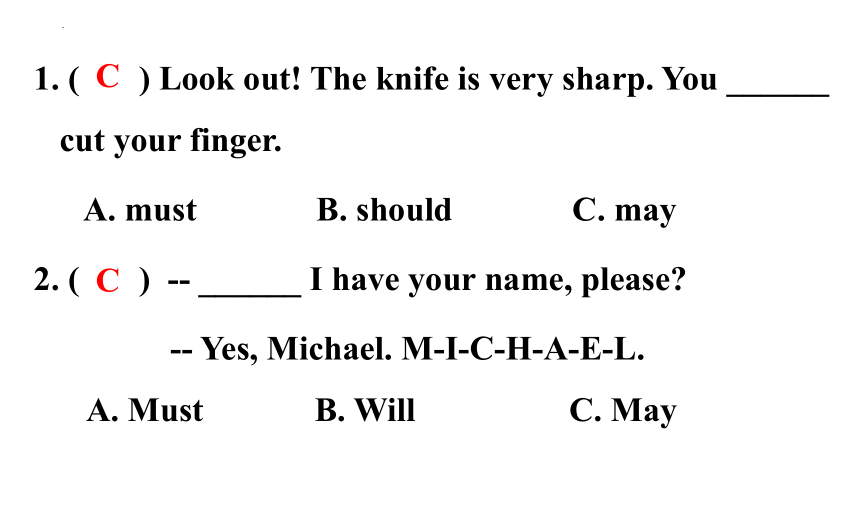
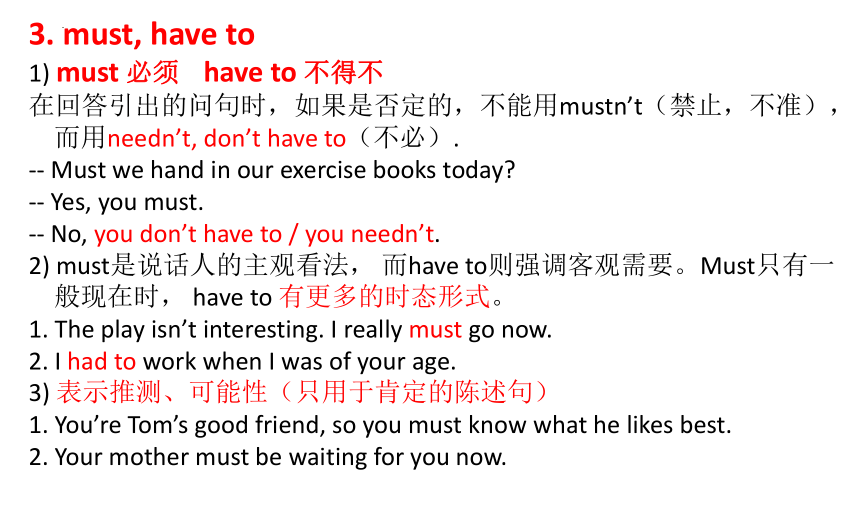
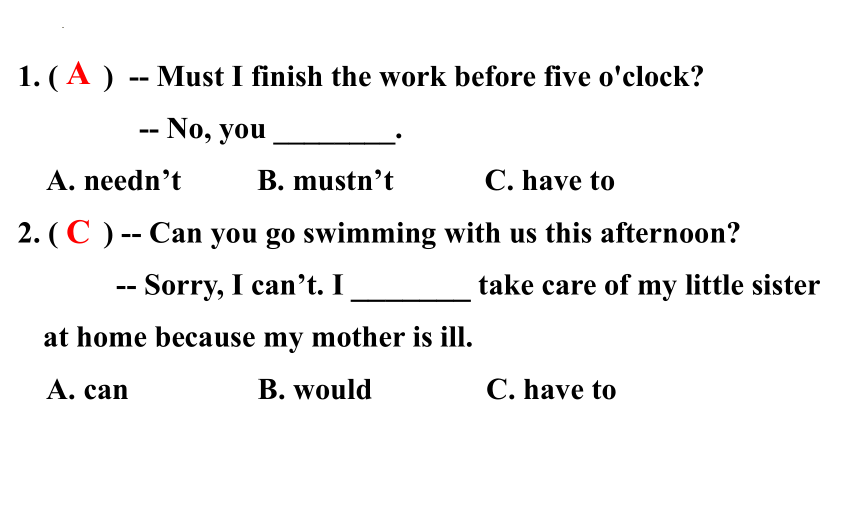

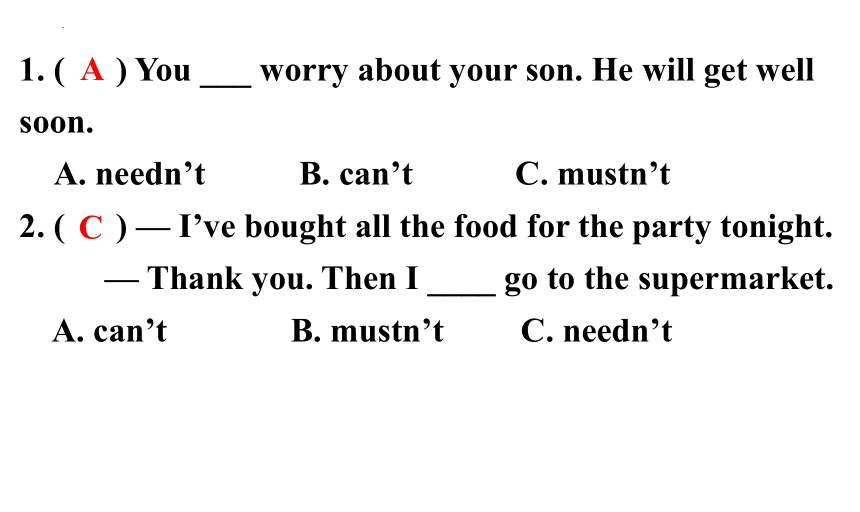
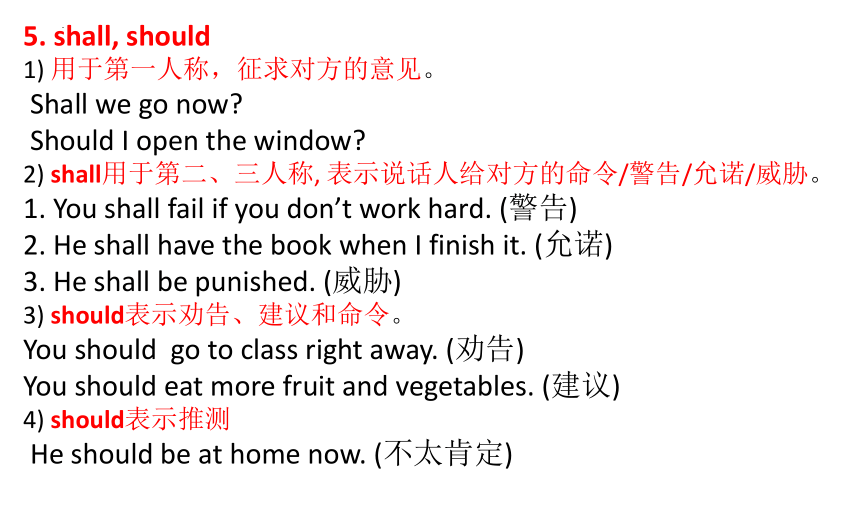
文档简介
(共33张PPT)
中考复习
专题八
情态动词及系动词
常见的情态动词:
can (could), may (might), must, have to,
shall (should), will (would), need (needed) 等。
情态动词无 人称 和 数 的变化;
不能单独使用,必须与其后的 动词原形 构成谓语。
一、情态动词:
1. can, could
1) 表示能力(体力、知识、技能)。
Can you lift this heavy box (体力)
Mary can speak three languages.(知识)
Can you skate (技能)
此时可用 be able to 代替。can只有一般现在时和一般过去式;而 be able to 则有更多的时态。
I’ll not be able to come this afternoon.
当表示“经过努力才得以做成功某事”时应用be able to,不能用can。如:
He was able to pass the exam through his hard work.
2) 表示请求。
-- Can I go now
-- Yes, you can. / No, you can’t.
此时可与 may 互换。在疑问句中还可用 could, might 代替,不是过去式,只是语气更委婉,不能用于肯定句和答语中。
-- Could I come to see you tomorrow
-- Yes, you can. ( No, I’m afraid not. )
3) 表示客观可能性(客观原因形成的能力)。
They’ve changed the timetable, so we can go by bus instead.
This hall can hold 500 people at least.
4) 表示推测(惊讶、怀疑、不相信的态度),用于疑问句、否定句(否定猜测)。
Can this be true
This can’t be done by him.
1. ( ) -- Can you speak Japanese
-- No, I____.
A. mustn’t B. can’t C. needn’t
2. ( ) ________ she ride when she was three years old
A. Can B. Could C. Need
3. ( ) Class 3 won the football match! ______ it be true
A. May B. Must C. Can
B
B
C
2. may, might
1) 表示请求。might比may语气更委婉,而不是过去式。否定回答时可用can’t 或mustn’t,表示“不可以,禁止”。
-- Might/ May I smoke in this room
-- No, you mustn’t / you can’t.
-- May/ Might I take this book out of the room
-- Yes, you can.
May I... 征徇对方许可时比较正式和客气,
Can I... 在口语中更常见。
2) 用于祈使句,表示祝愿。
May you succeed!
3) 表示推测、可能性(不用于疑问句)。
He may/might be right.
might不是过去式,它所表示的可能性比may小。
1. ( ) Look out! The knife is very sharp. You ______ cut your finger.
A. must B. should C. may
2. ( ) -- ______ I have your name, please
-- Yes, Michael. M-I-C-H-A-E-L.
A. Must B. Will C. May
C
C
3. must, have to
1) must 必须 have to 不得不
在回答引出的问句时,如果是否定的,不能用mustn’t(禁止,不准),而用needn’t, don’t have to(不必).
-- Must we hand in our exercise books today
-- Yes, you must.
-- No, you don’t have to / you needn’t.
2) must是说话人的主观看法, 而have to则强调客观需要。Must只有一般现在时, have to 有更多的时态形式。
1. The play isn’t interesting. I really must go now.
2. I had to work when I was of your age.
3) 表示推测、可能性(只用于肯定的陈述句)
1. You’re Tom’s good friend, so you must know what he likes best.
2. Your mother must be waiting for you now.
1. ( ) -- Must I finish the work before five o'clock
-- No, you ________.
A. needn’t B. mustn’t C. have to
2. ( ) -- Can you go swimming with us this afternoon
-- Sorry, I can’t. I _______ take care of my little sister at home because my mother is ill.
A. can B. would C. have to
A
C
4. need 作情态动词用时, 常用于疑问句、否定句。在肯定句中一般用must/have to/should代替。
1. You needn’t come so early.
2. -- Need I finish the work today
-- Yes, you must. / No, you needn’t.
1. ( ) You ___ worry about your son. He will get well soon.
A. needn’t B. can’t C. mustn’t
2. ( ) — I’ve bought all the food for the party tonight.
— Thank you. Then I ____ go to the supermarket.
A. can’t B. mustn’t C. needn’t
A
C
5. shall, should
1) 用于第一人称,征求对方的意见。
Shall we go now
Should I open the window
2) shall用于第二、三人称, 表示说话人给对方的命令/警告/允诺/威胁。
1. You shall fail if you don’t work hard. (警告)
2. He shall have the book when I finish it. (允诺)
3. He shall be punished. (威胁)
3) should表示劝告、建议和命令。
You should go to class right away. (劝告)
You should eat more fruit and vegetables. (建议)
4) should表示推测
He should be at home now. (不太肯定)
( ) You ___ go and see a doctor at once because you’ve got a fever.
A. can B. should C. will
B
6. will, would
1) will+动词原型 表示一般将来时
would+动词原型 表示过去将来时
I will go to the park tomorrow.
She said she would tell me the truth.
2) 表示请求、建议等,would更委婉。
Will / Would you pass me the ball, please
3) would 表示估计和猜想。
It would be about ten o’clock when she left home.
( ) -- Would you like to go boating with us
-- Yes, _______.
A. I’d like B. I want C. I’d like to
C
二、系动词
连系动词,也称系动词,它本身有词义,但不能单独用作谓语,其后必须跟表语,构成系表结构说明主语的状况、性质、特征等情况。系动词主要有以下分类:
种类 例词
状态系动词
表象系动词
持续系动词
感官系动词
变化系动词
be(是)
seem/appear(似乎)
remain/keep/stay(保持)
look(看起来), feel(感觉起来), smell(闻起来), sound(听起来), taste(尝起来)
become/get/grow(变得), turn(变成)
1. ( ) — Why do you _____ so sad
— Because I didn’t get the first place in the English competition.
A. look B. sound C. smell
2. ( ) When spring comes, trees begin to ______ green.
A. sound B. keep C. turn
3. ( ) — Mum, what are you cooking in the kitchen
It ______ so good!
— Fried noodles.
A. smells B. sounds C. looks
A
C
A
MORE EXERCISES
考点一:can的用法
1.1.----______ you ride a bike
----Yes,I can.
A.can B.may C. must D.need
2.---Look!It _____ be David in the room.
---It ______ be him. Because I saw him in the library a moment ago.
A.may; mustn't B.must; can't C.can; can't D.mustn't; can
A
B
表示能力,“能;会”
表示肯定推测用must;
表示否定推测用can't(不可能)
考点二:could的用法
3.Jenny finally got the job because she ________ speak English well.
A.might B.must C.could D.can
4.---David, ______ you please sweep the floor and take out the trash
---OK,mum.
A.could B.may C.should D.must
C
C
表示过去的能力
表示委婉语气,有礼貌地请求或建议,不是过去式。
考点三:may的语法
5.---Mum,______ I visit the Movie Museum tomorrow
---I'm afraid you can't. It is closed on Monday.
A.must B.may C.should D.need
6.---Do you have any plans for this Sunday
---I'm not sure.I _____ go to the countryside to see my grandmother.
A.can B.must C.may D.need
B
C
表示许可或请求许可,“可以”
表示可能性,“可能、也许”,常用于肯定句
考点四:might的语法
7.Life is changeable. No one knows what _____ happen in the future.
A.should B.need C.have to D.might
考点五:must的用法
8.You ____tell anybody about this. It's a secret.
A.can B.must C.mustn't D.may not
表示无法预知的情况或实现的可能性极小
表示强烈的禁止。
C
D
9.---Mum, must I go shopping with you
---No,you _____. You can watch the film with your friends.
A.needn't B.can't C.shouldn't D.mustn't
10.Harry has driven for 5 hours. He _____ be tired now.
A.need B.can C.shall D.must
A
D
对must的回答,如果不是禁止的事情,就用needn't 或don't have to 作答。
表示肯定推测用must。
考点六:need 的用法
need作情态动词
11.---Need I help you do the job, Jack
---No,you _______.
A.mustn't B.can't C.shouldn't D.needn't
12.---Need I wash the shoes at once,Mum
---Yes, you ______.
A.must B.do C.will D.need
D
A
1.need作情态动词,用于否定句和疑问句中。
2.Must/Need I... 的回答:
Yes,you must./No, you needn't
13.---Must I return the book this weekend
---No, you _______. You can___________ it for a week.
A.mustn't; borrow B.needn't;borrow
C.mustn't;keep D.needn't; keep
14.We___________(not need) clean our classroom today because it's very clean.
D
needn't
need作实义动词
15.We __________ more workers to do the work tomorrow.
A.needs B.need C.needed D.will need
16.Sam _________to go to work today.
A.needn't B.mustn't C.don't need D.doesn't need
17._____ you _____(need) to repair your broken car
D
D
Do
need
可用于任何句式及任何时态中
其他情态动词
18._______ you like to drink some coffee,Kate
A.Can B.Would C.May D.must
19.You ________ drive your car so fast. It's dangerous.
A.couldn't B.wouldn't C.shouldn't D.won't
20.----Bob, stay at home before I return.
----I _______,Mum.
A.should B.will C.can D.must
B
C
B
must 和have/has to do的区别
21.It's raining heavily outside, We ________ stay at home.
A.need B. must C.might D.have to
22.As students,we ________ obey the rules for school.
A.can B.have to C.must D.may
23.Jim _________ look after his little sister because his parent is out for their jobs.
A.can B.may C.need D.have to
must:侧重于主观看法、义务。
have to do:侧重于客观需要。
D
C
D
系动词
考点一:系动词与实义动词的区别
1.______ the picture,Tom. it _____ very nice, doesn't it
A. Look;looks B.Look at; looks at
C. Look at; looks D. Look; looks at
2._____! Who is singing in the room It _____ like Jay's song.
A.Sound; listens B.Listen; sounds
C.Sound;sounds D.Listen; listens
系动词不能单独做谓语,必须系+表。系动词+表语(说明主语的类别、身份、特征、性质等)
B
C
3.We should ____ healthy and _____ healthily in our daily life.
A.eat; keep B. eat; eat C.keep; keep D.keep; eat
4. Can you ______ something burning Go and see what's happening.
A. smell B. taste C. sound D. touch
D
A
5.The pizza looks _____ but tastes ______.
A. good; well B.well; good
C.good; terrible D.well; terribl
6.Our country is becoming _______________________(beautiful).
7.They _____________(get) married in 1990.
C
more and more beautiful
got
Thank you
中考复习
专题八
情态动词及系动词
常见的情态动词:
can (could), may (might), must, have to,
shall (should), will (would), need (needed) 等。
情态动词无 人称 和 数 的变化;
不能单独使用,必须与其后的 动词原形 构成谓语。
一、情态动词:
1. can, could
1) 表示能力(体力、知识、技能)。
Can you lift this heavy box (体力)
Mary can speak three languages.(知识)
Can you skate (技能)
此时可用 be able to 代替。can只有一般现在时和一般过去式;而 be able to 则有更多的时态。
I’ll not be able to come this afternoon.
当表示“经过努力才得以做成功某事”时应用be able to,不能用can。如:
He was able to pass the exam through his hard work.
2) 表示请求。
-- Can I go now
-- Yes, you can. / No, you can’t.
此时可与 may 互换。在疑问句中还可用 could, might 代替,不是过去式,只是语气更委婉,不能用于肯定句和答语中。
-- Could I come to see you tomorrow
-- Yes, you can. ( No, I’m afraid not. )
3) 表示客观可能性(客观原因形成的能力)。
They’ve changed the timetable, so we can go by bus instead.
This hall can hold 500 people at least.
4) 表示推测(惊讶、怀疑、不相信的态度),用于疑问句、否定句(否定猜测)。
Can this be true
This can’t be done by him.
1. ( ) -- Can you speak Japanese
-- No, I____.
A. mustn’t B. can’t C. needn’t
2. ( ) ________ she ride when she was three years old
A. Can B. Could C. Need
3. ( ) Class 3 won the football match! ______ it be true
A. May B. Must C. Can
B
B
C
2. may, might
1) 表示请求。might比may语气更委婉,而不是过去式。否定回答时可用can’t 或mustn’t,表示“不可以,禁止”。
-- Might/ May I smoke in this room
-- No, you mustn’t / you can’t.
-- May/ Might I take this book out of the room
-- Yes, you can.
May I... 征徇对方许可时比较正式和客气,
Can I... 在口语中更常见。
2) 用于祈使句,表示祝愿。
May you succeed!
3) 表示推测、可能性(不用于疑问句)。
He may/might be right.
might不是过去式,它所表示的可能性比may小。
1. ( ) Look out! The knife is very sharp. You ______ cut your finger.
A. must B. should C. may
2. ( ) -- ______ I have your name, please
-- Yes, Michael. M-I-C-H-A-E-L.
A. Must B. Will C. May
C
C
3. must, have to
1) must 必须 have to 不得不
在回答引出的问句时,如果是否定的,不能用mustn’t(禁止,不准),而用needn’t, don’t have to(不必).
-- Must we hand in our exercise books today
-- Yes, you must.
-- No, you don’t have to / you needn’t.
2) must是说话人的主观看法, 而have to则强调客观需要。Must只有一般现在时, have to 有更多的时态形式。
1. The play isn’t interesting. I really must go now.
2. I had to work when I was of your age.
3) 表示推测、可能性(只用于肯定的陈述句)
1. You’re Tom’s good friend, so you must know what he likes best.
2. Your mother must be waiting for you now.
1. ( ) -- Must I finish the work before five o'clock
-- No, you ________.
A. needn’t B. mustn’t C. have to
2. ( ) -- Can you go swimming with us this afternoon
-- Sorry, I can’t. I _______ take care of my little sister at home because my mother is ill.
A. can B. would C. have to
A
C
4. need 作情态动词用时, 常用于疑问句、否定句。在肯定句中一般用must/have to/should代替。
1. You needn’t come so early.
2. -- Need I finish the work today
-- Yes, you must. / No, you needn’t.
1. ( ) You ___ worry about your son. He will get well soon.
A. needn’t B. can’t C. mustn’t
2. ( ) — I’ve bought all the food for the party tonight.
— Thank you. Then I ____ go to the supermarket.
A. can’t B. mustn’t C. needn’t
A
C
5. shall, should
1) 用于第一人称,征求对方的意见。
Shall we go now
Should I open the window
2) shall用于第二、三人称, 表示说话人给对方的命令/警告/允诺/威胁。
1. You shall fail if you don’t work hard. (警告)
2. He shall have the book when I finish it. (允诺)
3. He shall be punished. (威胁)
3) should表示劝告、建议和命令。
You should go to class right away. (劝告)
You should eat more fruit and vegetables. (建议)
4) should表示推测
He should be at home now. (不太肯定)
( ) You ___ go and see a doctor at once because you’ve got a fever.
A. can B. should C. will
B
6. will, would
1) will+动词原型 表示一般将来时
would+动词原型 表示过去将来时
I will go to the park tomorrow.
She said she would tell me the truth.
2) 表示请求、建议等,would更委婉。
Will / Would you pass me the ball, please
3) would 表示估计和猜想。
It would be about ten o’clock when she left home.
( ) -- Would you like to go boating with us
-- Yes, _______.
A. I’d like B. I want C. I’d like to
C
二、系动词
连系动词,也称系动词,它本身有词义,但不能单独用作谓语,其后必须跟表语,构成系表结构说明主语的状况、性质、特征等情况。系动词主要有以下分类:
种类 例词
状态系动词
表象系动词
持续系动词
感官系动词
变化系动词
be(是)
seem/appear(似乎)
remain/keep/stay(保持)
look(看起来), feel(感觉起来), smell(闻起来), sound(听起来), taste(尝起来)
become/get/grow(变得), turn(变成)
1. ( ) — Why do you _____ so sad
— Because I didn’t get the first place in the English competition.
A. look B. sound C. smell
2. ( ) When spring comes, trees begin to ______ green.
A. sound B. keep C. turn
3. ( ) — Mum, what are you cooking in the kitchen
It ______ so good!
— Fried noodles.
A. smells B. sounds C. looks
A
C
A
MORE EXERCISES
考点一:can的用法
1.1.----______ you ride a bike
----Yes,I can.
A.can B.may C. must D.need
2.---Look!It _____ be David in the room.
---It ______ be him. Because I saw him in the library a moment ago.
A.may; mustn't B.must; can't C.can; can't D.mustn't; can
A
B
表示能力,“能;会”
表示肯定推测用must;
表示否定推测用can't(不可能)
考点二:could的用法
3.Jenny finally got the job because she ________ speak English well.
A.might B.must C.could D.can
4.---David, ______ you please sweep the floor and take out the trash
---OK,mum.
A.could B.may C.should D.must
C
C
表示过去的能力
表示委婉语气,有礼貌地请求或建议,不是过去式。
考点三:may的语法
5.---Mum,______ I visit the Movie Museum tomorrow
---I'm afraid you can't. It is closed on Monday.
A.must B.may C.should D.need
6.---Do you have any plans for this Sunday
---I'm not sure.I _____ go to the countryside to see my grandmother.
A.can B.must C.may D.need
B
C
表示许可或请求许可,“可以”
表示可能性,“可能、也许”,常用于肯定句
考点四:might的语法
7.Life is changeable. No one knows what _____ happen in the future.
A.should B.need C.have to D.might
考点五:must的用法
8.You ____tell anybody about this. It's a secret.
A.can B.must C.mustn't D.may not
表示无法预知的情况或实现的可能性极小
表示强烈的禁止。
C
D
9.---Mum, must I go shopping with you
---No,you _____. You can watch the film with your friends.
A.needn't B.can't C.shouldn't D.mustn't
10.Harry has driven for 5 hours. He _____ be tired now.
A.need B.can C.shall D.must
A
D
对must的回答,如果不是禁止的事情,就用needn't 或don't have to 作答。
表示肯定推测用must。
考点六:need 的用法
need作情态动词
11.---Need I help you do the job, Jack
---No,you _______.
A.mustn't B.can't C.shouldn't D.needn't
12.---Need I wash the shoes at once,Mum
---Yes, you ______.
A.must B.do C.will D.need
D
A
1.need作情态动词,用于否定句和疑问句中。
2.Must/Need I... 的回答:
Yes,you must./No, you needn't
13.---Must I return the book this weekend
---No, you _______. You can___________ it for a week.
A.mustn't; borrow B.needn't;borrow
C.mustn't;keep D.needn't; keep
14.We___________(not need) clean our classroom today because it's very clean.
D
needn't
need作实义动词
15.We __________ more workers to do the work tomorrow.
A.needs B.need C.needed D.will need
16.Sam _________to go to work today.
A.needn't B.mustn't C.don't need D.doesn't need
17._____ you _____(need) to repair your broken car
D
D
Do
need
可用于任何句式及任何时态中
其他情态动词
18._______ you like to drink some coffee,Kate
A.Can B.Would C.May D.must
19.You ________ drive your car so fast. It's dangerous.
A.couldn't B.wouldn't C.shouldn't D.won't
20.----Bob, stay at home before I return.
----I _______,Mum.
A.should B.will C.can D.must
B
C
B
must 和have/has to do的区别
21.It's raining heavily outside, We ________ stay at home.
A.need B. must C.might D.have to
22.As students,we ________ obey the rules for school.
A.can B.have to C.must D.may
23.Jim _________ look after his little sister because his parent is out for their jobs.
A.can B.may C.need D.have to
must:侧重于主观看法、义务。
have to do:侧重于客观需要。
D
C
D
系动词
考点一:系动词与实义动词的区别
1.______ the picture,Tom. it _____ very nice, doesn't it
A. Look;looks B.Look at; looks at
C. Look at; looks D. Look; looks at
2._____! Who is singing in the room It _____ like Jay's song.
A.Sound; listens B.Listen; sounds
C.Sound;sounds D.Listen; listens
系动词不能单独做谓语,必须系+表。系动词+表语(说明主语的类别、身份、特征、性质等)
B
C
3.We should ____ healthy and _____ healthily in our daily life.
A.eat; keep B. eat; eat C.keep; keep D.keep; eat
4. Can you ______ something burning Go and see what's happening.
A. smell B. taste C. sound D. touch
D
A
5.The pizza looks _____ but tastes ______.
A. good; well B.well; good
C.good; terrible D.well; terribl
6.Our country is becoming _______________________(beautiful).
7.They _____________(get) married in 1990.
C
more and more beautiful
got
Thank you
同课章节目录
- 词法
- 名词
- 动词和动词短语
- 动词语态
- 动词时态
- 助动词和情态动词
- 非谓语动词
- 冠词
- 代词
- 数词和量词
- 形容词副词及其比较等级
- 介词和介词短语
- 连词和感叹词
- 构词法
- 相似、相近词比较
- 句法
- 陈述句
- 一般疑问句和否定疑问句
- 特殊疑问句及选择疑问句
- 反意疑问句
- 存在句(There be句型)
- 宾语从句
- 定语从句
- 状语从句
- 主谓一致问题
- 简单句
- 并列句
- 复合句
- 主谓一致
- 主、表语从句
- 名词性从句
- 直接引语和间接引语
- 虚拟语气
- 感叹句
- 强调句
- 倒装句
- 祈使句
- 句子的成分
- 句子的分类
- 题型专区
- 单项选择部分
- 易错题
- 完形填空
- 阅读理解
- 词汇练习
- 听说训练
- 句型转换
- 补全对话
- 短文改错
- 翻译
- 书面表达
- 任务型阅读
- 语法填空
- 其他资料
